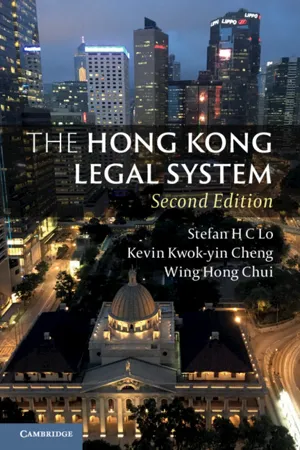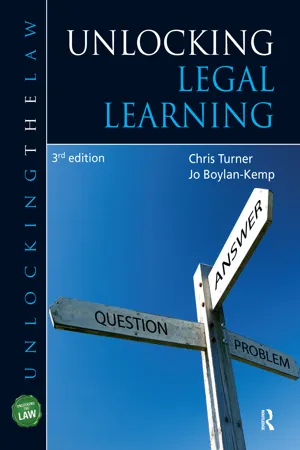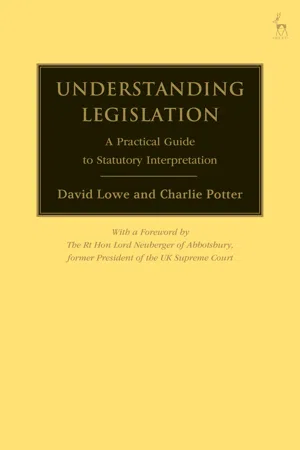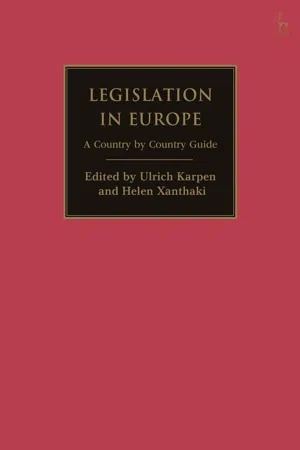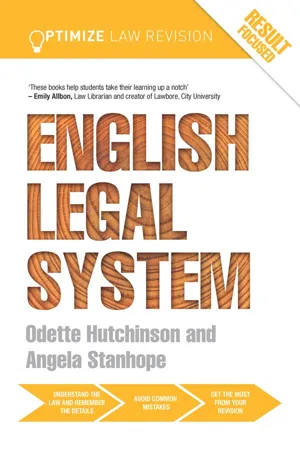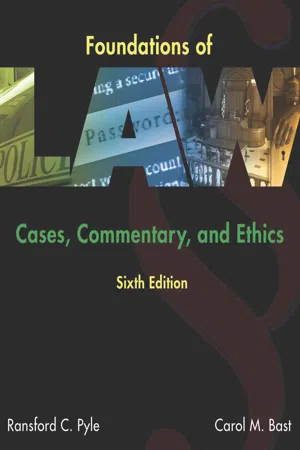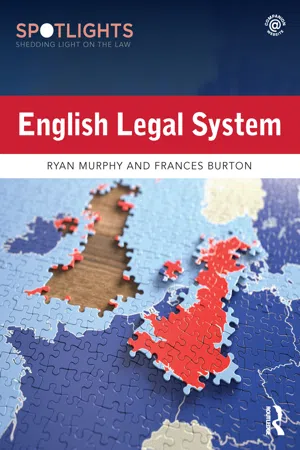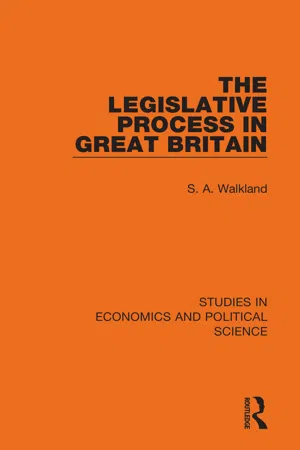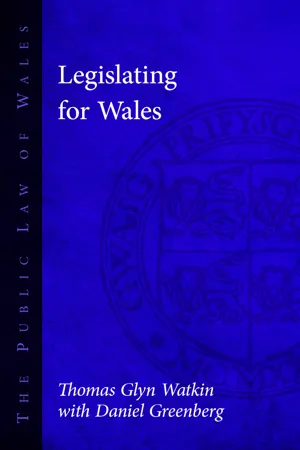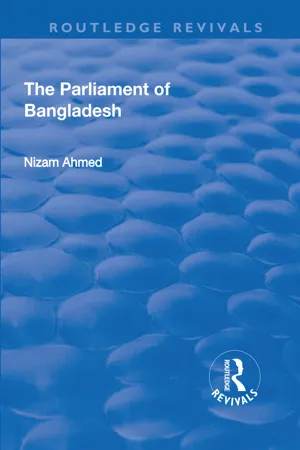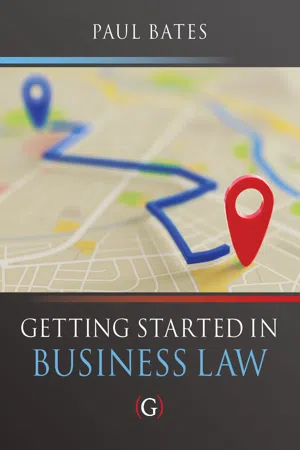Law
Primary Legislation
Primary legislation refers to laws that are created by a legislative body, such as a parliament or congress. It is the main source of law and is often in the form of acts or statutes. Primary legislation has the highest legal authority within a legal system and serves as the foundation for other types of laws and regulations.
Written by Perlego with AI-assistance
Related key terms
1 of 5
12 Key excerpts on "Primary Legislation"
- eBook - ePub
- Sharon Hanson, Tobias Kliem, Ben Waters(Authors)
- 2021(Publication Date)
- Taylor & Francis(Publisher)
Chapter 3 .Primary and secondary domestic legislation are described and the standard method of creating them is set out. The standard layout of domestic legislation is also dealt with. A brief explanation of statutory interpretation by the judiciary is given; however, detailed discussion of this area is reserved for Chapter 7 , which concentrates on the skills of reading, analysing and interpreting legislation.What is domestic legislation?
Domestic legislation is the dominant form of law making in the English legal system and it is created by the authority of Parliament. It exists in two main forms, primary and secondary legislation. Primary Legislation (statutes) applies to the whole of the English legal system and is created by Parliament directly. It can deal with any subject matter that Parliament wishes.Secondary legislation (delegated legislation) is created by others acting on powers delegated to them in Primary Legislation, which in these circumstances can be described as ‘enabling’ or ‘parent’ legislation. For example, an individual minister of state may be given powers to make changes to certain Primary Legislation. Or a professional body may be allowed to make legal rules affecting its members. A local council1 can enact legal rules applicable only to the geographic area of the council. Secondary legislation is often described as an indirect form of law making and can be additionally referred to as delegated or subordinate legislation. It can be repealed or changed by Primary Legislation.1 Technically referred to as a local authority (LA).Twining and Miers describe legislation as encompassing a wide variety of rules in ‘fixed verbal form’.22 W Twining and D Miers, How to Do Things with Rules (Cambridge University Press, Cambridge, 2010), 193.Legislation is enacted in various timescales. Sometimes legislation is quickly created as a reaction by Parliament to a crisis or public outcry or a one-off situation, for example, in response to an act of terrorism (an often-cited example is the Dangerous Dogs Act 1991).3 Sometimes it is a reasonably well-considered response to a particular issue such as consumer protection. On other occasions it is the end product of several years of public, political and expert consultation. The Equality Act 20104 - eBook - PDF
- Stefan H. C. Lo, Kevin Kwok-yin Cheng, Wing Hong Chui(Authors)
- 2019(Publication Date)
- Cambridge University Press(Publisher)
Primary Legislation is, essentially, the traditional type of statute law created by a legislative process performed by the supreme legislature. It is a general term used to describe the main laws passed by the legislative body of a place, and it is usually collected in ‘statute books’. In Hong Kong, the statute book comprises the statute law of Hong Kong, which is referred to as ‘Ordinances’. A quick search on the Hong Kong e-Legislation (HKeL) database on the world wide web will reveal all of Hong Kong’s legislation in both English and Chinese. Primary Legislation also incorpor- ates some statutory provisions of the People’s Republic of China that are relevant to Hong Kong. 40 Ordinances are the result of the formal process of positing law through the legislative procedure in Hong Kong. Broadly speaking, the formal process consists of seven main stages, including (1) the proposal, (2) consultation papers, (3) producing a bill, (4) reading the bill in the Legislative Council, (5) the Chief Executive’s signature and promulgation, (6) publication in the Government Gazette and (7) reporting to the NPCSC. 41 The Proposal This is the proposition that a law should be amended, created or repealed. Most proposals come from governmental departments in charge of policy areas. An example is the 2002 proposal from the Security Bureau for 39 On the separation of powers, see Chapter 3. 40 See I. Dobinson and D. Roebuck, Introduction to Law in the Hong Kong SAR, 2nd ed. (Hong Kong: Sweet & Maxwell Asia 2001). 41 For more details on the law-making process in Hong Kong, see Legislative Council Secretariat Education Service Team, How Laws Are Made (Legislative Council in Brief No. 7). (Hong Kong: Legislative Council 2017) p. 4, available at www.legco.gov.hk/ education/files/english/Factsheet/Factsheet7.pdf. The Process of Legislation 191 - eBook - ePub
- Chris Turner, Jo Boylan-Kemp(Authors)
- 2013(Publication Date)
- Routledge(Publisher)
secondary legislation.Primary Legislationlaw made directly by Parliament, and published as Acts of Parliament4.2 Primary Legislation Primary Legislation is the name applied to Acts of Parliament or Statutes. Acts of Parliament can be divided into two categories – Public General Acts and Local and Personal Acts.Secondary Legislationlaw made by organisations to whom Parliament has delegated authority, and published as Statutory Instruments. May also be referred to as subordinate or delegated legislationFigure 4.1 Types of Acts of Parliament4.2.1 How to Refer to Primary LegislationTutor TipThe terms ‘Act of Parliament’ and ‘Statute’ are interchangeable and refer to the same thing, so don’t panic if one lecturer tells you to read an Act and another one tells you to read a Statute.Acts of Parliament can be referred to in a number of ways (see Figure 4.2 below):- by short title
- by long title
- by official citation (year and chapter number).
Figure 4.2 Ways of referring to Acts of ParliamentAn Act is divided into a series of numbered sections, each with a descriptive title. The word ‘section’ is often abbreviated to ‘s’ or ‘ss’ in the plural. Sections of an Act may be divided into subsections (‘subs’); subsections may be divided into paragraphs (‘para’); and paragraphs may be further divided into subparagraphs (‘subpara’).4.2.2 Official CitationsThe Official Citation for Acts of Parliament is made up of the year (in which the Act received Royal Assent) and the Chapter number (a running number throughout each calendar year). Chapter can also be abbreviated to c., cap. or chap.Figure 4.3 Citations for The Charities ActTutor TipPublic General Acts are cited using cardinal numerals (e.g. 1, 2, 3) and Local and Personal Acts are cited using roman numerals (e.g. i, ii, iii): - eBook - PDF
Understanding Legislation
A Practical Guide to Statutory Interpretation
- David Lowe, Charlie Potter(Authors)
- 2018(Publication Date)
- Hart Publishing(Publisher)
supreme, source of domestic law, taking precedence over all forms of secondary legislation and the exercise of legal powers deriving from the Royal prerogative. 8 1.6 Statutes may be enacted to introduce completely new laws or to effect some change in existing laws. They are brought into being upon their formal enact-ment by the UK’s sovereign legislature, the ‘Crown in Parliament’. In the ordinary course, this will require an Act to be formally passed by both Houses of Parliament (the House of Commons and the House of Lords) and to be granted Royal Assent by the reigning monarch. 9 1.7 There exist certain other forms of legal instrument which are ‘primary’ in nature, in that they do not derive their legal effect from other legal instru-ments, but instead from the Royal prerogative. These include certain Orders in Council 10 and Royal Charters. 11 However, the long-established limits on the scope of prerogative powers mean that such instruments cannot nowadays be used in relation to the UK to exercise any power which is truly legislative in nature 12 (although prerogative Orders in Council may be used to legislate for 4 Introduction to Domestic Legislation: Statutes and Subordinate Legislation 13 See the discussion in R (Bancoult) v Secretary of State for Foreign and Commonwealth Affairs (No 2) [2008] UKHL 61, [2009] 1 AC 453 [31]–[35] (Lord Hoffmann). 14 For completeness, Measures of the Church of England are sometimes described as Primary Legislation (and are so designated for the purposes of the Human Rights Act 1998 by s 21(1)(d) and (e) of that Act). However, they are not truly primary in nature, given that they derive their ultimate author-ity as legislation from s 4 of the Church of England Assembly (Powers) Act 1919, which gives them ‘the force and effect of an Act of Parliament’. In any event, they are extremely few in number and their significance is limited to the Church of England. - eBook - PDF
Legislation in Europe
A Country by Country Guide
- Ulrich Karpen, Helen Xanthaki, Ulrich Karpen, Helen Xanthaki(Authors)
- 2020(Publication Date)
- Hart Publishing(Publisher)
As such, in day-to-day matters, acts are of greater importance. According to Byrne, ‘legislation accounts for large sections of the law as might be expected in an era where the state assumes the principal regulatory role in society’. 6 Legislation in Ireland 253 7 Pigs Marketing Board v Donnelly [1939] IR 413. Beneath Primary Legislation, there is secondary legislation. This goes by a multitude of names: secondary legislation, subordinate legislation, delegated legislation and statu-tory instruments. The key point is that there is no free-standing power to make secondary legislation – the power must derive from a specific authority in a piece of Primary Legislation. Thus, the Primary Legislation will say ‘the Minister may, by regulations, do XYZ’. Then, in exercise of this power, the minister will make that secondary legislation, and only to the extent authorised by Primary Legislation. Although a strict reading of the Constitution may imply that only the Oireachtas can make legislation, it has long been held that the Oireachtas can delegate the power to fill in the details of the law to others. 7 Secondary legislation is generally made by a minister, although occasionally by another emanation of the state. There is a much greater volume of secondary legislation than of Primary Legislation. For example, in 2018 there were 665 pieces of secondary legislation listed on the government’s website, whereas there were only 44 acts listed (including 2 acts amending the Constitution). The content of secondary legislation generally fills in details not mentioned in Primary Legislation. For example, if the Primary Legislation says that a particular activity may be carried out if a department grants a licence to do so, the secondary legislation may state the procedure for applying for that licence, the cost of it, the forms to be filled in etc. Secondary legislation is also used if there is technical information to be included in a law or if it is subject to rapid change. - eBook - ePub
- Angela Stanhope, Odette Hutchinson(Authors)
- 2014(Publication Date)
- Routledge(Publisher)
Parliament is the supreme law-making body in the English legal system. This means that Parliament has the power to enact, revoke or amend any law it wants. Parliament cannot however, bind its successors. This means that no Parliament can enact a law that cannot be revoked or amended by Parliament in the future.Statutes or Acts of Parliament are supreme; they override all existing common law provisions. The courts are subordinate to the legislature (Parliament). In the event of conflict between an Act of Parliament and case law, the Act of Parliament prevails.Aim Higher — revision tipThe significance of parliamentary sovereignty should not be underestimated. It is a topic that can come up in its own right. It is also a principle that links to several other topics within all ELS courses.Some students will study Public Law / Constitutional and Administrative Law at the same time as the English legal system and in many ways this is helpful, because it will consolidate knowledge and understanding in this area. For those of you that are not yet studying Public / Constitutional and Administrative Law, you will find more information on the topic in Unlocking Constitutional and Administrative Law by Ryan and Foster. This is a really approachable textbook and it has lots of useful diagrams and tables.Primary LegislationThe origins of legislation
The government in the English legal system is responsible for generating, and enacting, most legislation that becomes law. It is possible, however, for individual Members of Parliament to propose legislation. This can happen in one of three ways:All statutes begin life as a Bill. A Bill may start life as a government consultation paper. There are two types of government consultation papers that you will need to be aware of these are: - eBook - PDF
Foundations of Law
Cases, Commentary and Ethics
- Ransford Pyle, Carol Bast(Authors)
- 2016(Publication Date)
- Cengage Learning EMEA(Publisher)
Although the states differ in the extent to which they have codification May refer to the simple process of turning a custom or common law rule into legislation but usually refers to the making of a code, that is, a set of written rules. Copyright 2017 Cengage Learning. All Rights Reserved. May not be copied, scanned, or duplicated, in whole or in part. Due to electronic rights, some third party content may be suppressed from the eBook and/or eChapter(s). Editorial review has deemed that any suppressed content does not materially affect the overall learning experience. Cengage Learning reserves the right to remove additional content at any time if subsequent rights restrictions require it. Sources of the Law: Legislation 93 codified state law, every state has enacted a complex body of statutes that serves as a principal source of law. The rise of the power of legislatures is reflected in the courts, which now defer to the statutes. Nevertheless, because disputes over the law must ultimately be resolved in the courts, the meaning of legislation is decided by the courts and applied to specific cases. THE NATURE OF LEGISLATION In Chapter 3, legislation was distinguished from judge-made law by its characteristics of “universal application and future effect.” The line drawn between the characteristics of legisla-tion and adjudication has not always been clear. In the past, legislatures often passed special bills to define narrow rights of individuals or local entities, but this practice has always been viewed with suspicion (see the 1851 case of Ponder v. Graham ). When a legislative body nar-rows its focus to resolve a particularized dispute, its actions may be challenged in court as violating the principle of separation of judicial and legislative powers embodied in federal and state constitutions. - eBook - ePub
- Ryan Murphy, Frances Burton(Authors)
- 2020(Publication Date)
- Routledge(Publisher)
It is important to remember this when assessing the impact of particular pieces of legislation that have a constitutional flavour. It is no longer sufficient to view each piece of legislation in isolation and it is important not only to think of whether it is of a constitutional nature itself but also whether it will conflict with earlier Acts or principles of a constitutional nature. This task of identifying ‘constitutional’ Acts of Parliament is complicated by the fact that they will, until labelled as such by a court, appear to be a regular Act of Parliament. So-called constitutional Acts will follow exactly the same procedure as any other Act of Parliament in their passage through the legislative process.Conclusion
The law-making process, as it applies to Primary Legislation, is complex and highly politically charged. However, it is crucial for those wishing to understand the English Legal System to appreciate fully the importance of every step of the process that leads to Primary Legislation. Without understanding the context of how an Act of Parliament came into force it can be difficult to understand how it was intended to apply and how it will be received by both the courts and the wider public.Moreover, and beyond the mere mechanics of the law-making process, with its many steps and procedures, it is important to note some of the broader themes that arise out of the discussion in this chapter. First, the process tells us something about the involvement (or lack thereof ) of citizens in that process. At present, the role of participatory democracy in the English Legal System is somewhat limited. Citizens elect their MPs (who are only part of the legislature) and thereafter the role of the individual member of the public is largely over until the next General Election, some five years hence. The English Legal System has informal channels through which the individual may influence law-making, such as exerting pressure on the Government to introduce specific policies. Increasingly, there are also more formal channels for recognising the role of the citizen in the process - eBook - ePub
- S. A. Walkland(Author)
- 2021(Publication Date)
- Routledge(Publisher)
Legislation as a ProcessThe end-products of legislation are easily recognized. They are Acts of Parliament as published in the Statutes Revised, and the contents of the collected annual volumes of Statutory Instruments.Difficulties arise, however, when a conceptual definition of legislation is attempted—to try to show how, in substance, legislation differs from other broad governmental processes such as administration and adjudication. Attempts at a rigid classification along conceptual lines break down at the margins, and the conclusion cannot be avoided that the main differences between the ways in which determinations of public questions are made in any governmental system are largely procedural, and do not relate to any general inherent functional differences between the main activities of public authorities.A conceptual definition of legislation which is often attempted states that it consists, to quote one authority, ‘of the making of determinations which are issued to indicated but unnamed and unspecified persons or situations’.1 Here the important characteristic of legislation is regarded as being that of generality of application. Another definition, substantially similar, and attempting to distinguish between legislation and the work of the courts, suggests that legislation normally ‘affects the rights of individuals in the abstract and must be applied in a further proceeding before the legal position of an individual will be touched by it, whilst adjudication operates concretely upon individuals in their individual capacity’.2 The Donoughmore-Scott Report on Ministers’ Powers in 1932 similarly held that ‘the power to issue a particular command’ was ‘in no sense legislative’.3 Other attempts at defining a legislative function rely on the fact that legislation characteristically looks to the future, whilst judicial enquiries investigate present or past facts.1 K. C. Davis, Administrative Law - eBook - ePub
- Thomas Glyn Watkin, Daniel Greenberg(Authors)
- 2018(Publication Date)
- University of Wales Press(Publisher)
This is the case with the National Assembly for Wales. The opportunity to challenge proposals which have been agreed prior to final promulgation should not be confused with the continuing right of citizens to challenge enacted laws on the grounds that a legislature has exceeded its powers. The former is part of the law-making process; the latter is not. 1-20 It is not only devolved legislatures and the legislatures of countries with written constitutions that have limited legislative powers. The same is true of legislators to whom legislative power is delegated by national or regional legislatures. It is not uncommon for government ministers or other public bodies to be given such delegated powers to make laws, which laws are then described as delegated or subordinate or secondary legislation, terms which are more or less synonymous. Even where it is one person, such as a government minister, who has the power to make such laws, the three phases of law-making can still be identified. A proposal to make subordinate legislation will come from the minister or be presented to him to adopt by his officials. He will deliberate by taking advice from his officials and possibly by engaging the public through going out to consultation. On the basis of such deliberation, he will decide to make the law, usually by signing a document, called a statutory instrument, containing the subordinate legislation he is making. His signature may in itself be sufficient to make the law, but he may be required to submit it to the legislature and give them opportunity to annul it, or he may even be required to submit the document to the legislature for approval. There are various ways in which the decision-making phase may be organized but, whichever way is chosen, its presence can be identified. The three phases are always present. 1-21 TERMINOLOGY A legislative proposal before the United Kingdom Parliament or before the National Assembly for Wales is referred to as a Bill - eBook - ePub
- Nizam Ahmed(Author)
- 2018(Publication Date)
- Routledge(Publisher)
Chapter 4 LegislationLegalistically, the formal responsibility for making laws everywhere rests with the legislature. In practice, as observed in an earlier chapter, legislatures share lawmaking functions with other actors, especially the executive. Laws are unique resources that governments need, among others, to survive in power. As Mechelen and Rose (1986, p.8) observe, 'Laws are an input as well as an output... Laws influence other resources of government and sustain the momentum of programmes'. In order to understand government, 'we must understand the role of law. Acts of parliament constitute the stuff of law' (Mechelen and Rose, p.8). This chapter examines the legislative orientation of the government identifying, for example, the nature of laws it has proposed to the JS and the methods used to establish its dominance in the legislative process. It compares the legislative behaviour of the private member and the government, examining the difference, if any, and explaining the reasons that cause it. The chapter also provides a comparative assessment of the legislative orientation of private members of different JSs. The final section explores the limits of government domination in the legislative process.The Formal Framework
Ritually or otherwise, the JS is considered to be the supreme lawmaking authority in Bangladesh. Article 65 (1) of the Constitution provides: 'There shall be a Parliament for Bangladesh in which subject to the provisions of this Constitution, shall be vested the legislative powers of the Republic' (GPRB, 1996, p.50). The parliament, however, can delegate to any person or authority power to make orders, rules, regulations, by-laws and other instruments having legislative effect (GPRB, p.50). The constitution also empowers the President to promulgate ordinances, which have legally the same effect as laws made by the JS. The presidential lawmaking authority has, however, certain limits. He (President) can promulgate ordinances when the JS is not in session, or it stands dissolved. Perhaps more importantly, the constitution requires that all ordinances made by the President be laid before the JS at its first meeting held immediately after their promulgation. These can become permanent laws only after the JS has passed them. Otherwise, these lose validity on the expiration of one month following their tabling in the JS. Another limitation is that no ordinance promulgated by the President can make any provision which cannot be lawfully made by an act of parliament. Nor can an ordinance provide for altering or repealing any article of the constitution (GPRB, p.76). - eBook - PDF
- Paul Bates(Author)
- 2021(Publication Date)
- Goodfellow Publishers(Publisher)
Here there is no substitute for repeatedly skimming through any up to date law book. Actually, there’s no excuse for not doing this anyway. So, by the above process we arrive at a new piece of legislation or a statute or Act of Parliament. These are said to be democratically arrived at as all mem-bers of Parliament have the chance to vote for or against the proposed new statute. This is why legislation produced by parliament is so important. Such Getting Started in Business Law 16 a statute has overriding force throughout the land. In theory parliament has the right to pass any act on any subject that they want. An Act can overturn any law made by judges. Hence, it is said that Acts of Parliament are supreme. Historically this makes sense. Originally the monarch had ultimate power. A King or Queen a few years ago (historically) could after all decide to cut your head off if they wanted to. Over the course of many hundreds of years for reasons I won’t bore you with here, the power of the monarchy declined as the power of Parliament rose. Eventually Parliament became the supreme power so, it is argued, they can pass any piece of legislation that might take their fancy. It’s often said that parliament can ‘make or unmake’ any law that they want. If you want to know how many statutes are currently in force, I suggest you go to the Ministry of Justice website and start counting. Actually, I sug-gest you don’t do this unless you’re having a particularly sleepless night. Apparently, alcohol is a depressant. It may well be, but not as much as this website. There are literally thousands of acts. Some of these you will most likely be aware of, most of them you probably won’t be aware of and have no need to be. To give you a flavour of some of the acts that you will almost certainly need to be aware of, I will just take a handful and you can see if they affect you at all.
Index pages curate the most relevant extracts from our library of academic textbooks. They’ve been created using an in-house natural language model (NLM), each adding context and meaning to key research topics.

